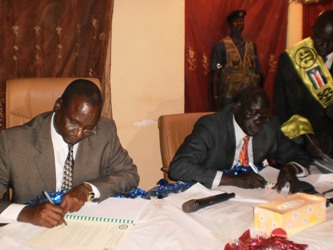Unity state adopts new transitional constitution
February 10, 2012 (BENTIU) – The Unity State government signed into law a new transitional state constitution on Friday after three months of amendments. Unity State Assembly’s 48 members of parliament, state ministers, state advisors and county commissioners witnessed governor Taban Deng Gai and Speaker Simon Maguek Gai sign the document in Bentiu.

The interim constitution was established as part of the power and wealth sharing deal between the National Congress Party (NCP) in Khartoum and former rebels the Sudan People Liberation Movement (SPLM/A), who have governed South Sudan since a 2005 peace deal.
After the signing of the state transitional constitution, the state governor took an oath pledging to follow the new laws and serve the people of the state.
“I Taban Deng Gai do hereby swear by almighty God solemnly affirm that as the governor of Unity State I shall be faithful and bear true allergen to the state and shall diligently and honestly discharges his duties and responsibilities in consulted manner and preserved the integrity and dignity of the people of state, so help me God.”
Governor Deng appointed Gideon Gatpan Tuor MP to represent disabled people in the state assembly.
State speaker, Simon Maguek Gai, said that the signing of the new constitution was very important for the people of Unity State.
Speaker Gai was reappointed was seconded the MP for Budang Payam [district] of Rubkotna County, Andrew Bol Nhial.
South Sudan’s transitional constitution came into force on 9 July 2011 when it seceded from North Sudan as part of a 2005 peace deal. The process proved controversial with parties pulling out of the progress complaining that it was dominated by the ruling SPLM.
Critics of the constitution, some whom were senior members of the SPLM, said that it gave too many powers the President. The transitional national constitution gives President Kiir the ability to sack elected officials at all levels if he believes it is in the interest of national security.
The critics also said that more powers should have been given South Sudan’s ten states rather than concentrated in the capital Juba. Lack of federalism is one of issues that insurgent groups in oil-rich Unity State have used to justify fighting against the government.
Cattle raiding between Unity State and neighbouring Lakes and Warrap states has also proved a problem for the Bentui government.
The UN says that insecurity in the state has forced cattle herders to change migration exposing their cattle to fatal insect-borne diseases.
(ST)
